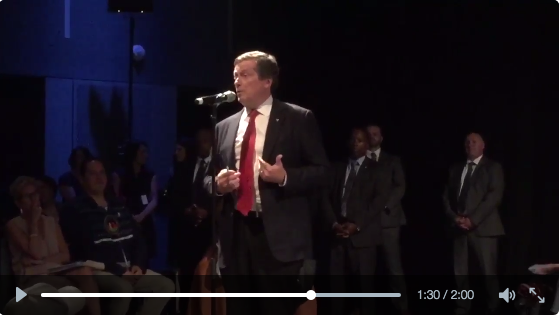More than 500 people gathered in downtown Toronto to discuss systemic racism. The event marked the first of nine public meeting across the province aimed at engaging the public as part of the Ontario Government’s Anti-Racism Directorate. The Anti-Racism Directorate is a collection of governmental experts with a mandate to “apply an anti-racism lens in developing, implementing and evaluating government policies, programs and services.” Below you’ll find some lessons I took from the first meeting as well as a few powerful soundbytes from community members.
1. Trauma abounds
From victims of health care providers that dehumanize patients and constrain medical benefits to survivors of residential schools, members of the community shared heartbreaking stories of trauma and violence. This pain compelled some to wait in line for more than two hours to have their story heard.
“Your people brought slavery here….When I hear ‘shut up,’ that comes from the residential school era and I will not ‘shut up.'”
2. Anti-Black racism
While the anti-racism directorate aims to address systemic racism in Canada’s and service sectors, for many in attendance it was important to specifically name anti-Black racism. A general concept of racism does not sufficiently capture the perpetual devaluing of Black lives in this country.
“When you [police] pick up a Black man — you’re looking for someone six-foot-two and you grab a man five-foot-five — that’s racism.”
3. Black money matters
There is a long history of the undercapitalization of black communities in Toronto. And Caribana, as one speaker noted, provides an illustrative example. In the past, elected officials have told people of colour to look to “our community” for financial support and threatened to defund Caribana. All of this has occurred despite Caribana’s immense cross-cultural popularity and the staggering economic boost it provides for Toronto. In recent years, Caribana has secured corporate sponsorships at the cost of concessions that undercut its cultural significance while very little of the revenue it generates is reinvested in Black communities.
“Caribana has brought substantial money to this province…we in the Black community intend to take back Caribana. Black money matters!”
4. School-to-prison pipeline
It was two hours into the meeting before someone addressed the school-to-prison pipeline. The speaker reflected upon their own time in prison as well as the challenges of getting a motivational, community-based curriculum they created (see www.180changestreet.com) into Toronto schools. They drew widespread applause as they addressed the violence of a system that criminalizes black youth while simultaneously celebrating job creation initiatives that preclude anyone with a criminal record.
Desmond Cole also spoke to the premier directly about the immigration detainees who are on hunger strike, and called on her to pressure the federal government and refuse to hold any more detainees in provincial prisons.
5. Music is empowerment
Self-expression — whether in song, dance, or otherwise — has animated Black and Indigenous resistance for centuries. At last night’s event, one community used their time to speak as an opportunity to lead the crown in Janelle Monae’s “Hell You Talmbout.” In 2015, “Hell You Talmbout” emerged as a protest song and tribute to the many black lives that have been taken by police.
“Now what the hell
Hell you talking ’bout?
Now what the hell
Hell you talking ’bout?Andrew Loku, say his name!
Andrew Loku, say his name!
Jermaine Carby, say his name!
say his name! say his name!”
6. Distrust authority
It became readily apparent that many people of colour in Toronto deeply distrust the municipal and provincial governments. Speakers stressed that they were tired of talking and needed to see action. The distrust of authority that has infiltrated these communities will not dissipate until real and substantive action occurs.
“I’m a little shocked to see John Tory here. You’re piggybacking off Kathleen Wynne….You are a coward!”
“When Kathleen Wynne was elected she said she would listen to the voiceless and…”
MEMBERS OF AUDIENCE: “SHE LIED!”
7. Black Lives Matter Toronto (BLMTO) has less support than you think
The room grew tense on a few occasions as people of colour used their time to voice their strong disapproval of the tactics and strategies of BLMTO. Though some members of the crowd booed, these moments were important reminders of the significant difference of opinion amongst and between radical activists in Toronto about how to combat systemic and anti-black racism.
8. BLMTO has more support than you think
Several organizations including the Asian Canadian Labour Alliance and the United Steelworkers Union expressed their solidarity with Black Lives Matters. The BLM movement has worked to increase the visibility of Black people and many media outlets have used this as occasion to imply that the priorities and principles expressed by BLM are only shared by Black people. This is not true. As the expressed support of the many organizations in attendance suggests, many non-Black Torontonians recognize the seriousness of anti-Black racism in this country.
9. Change will happen with or without you
Many community members alluded to concrete plans they had developed in consultation with lawyers, mental health professionals and other supports to address issues within Toronto’’s black communities. As they stood across from Premier Wynne and Mayor Tory, they pleaded for resources to implement their plans but also defiantly noted that “Change will happen with or without you.”
Image: Twitter/@JessicaB-U



